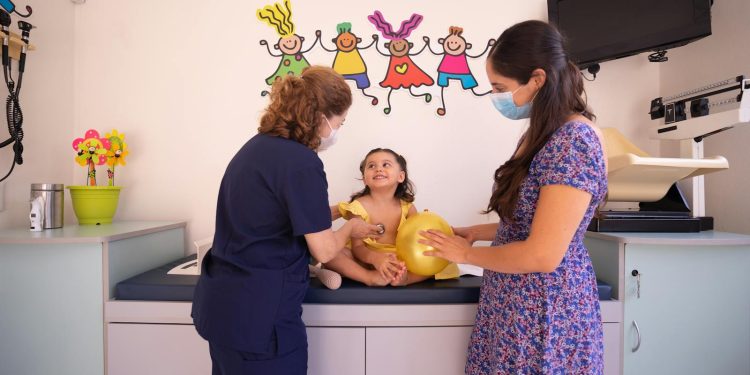As a new parent, your baby’s health is always at the forefront of your mind. Between sleepless nights and constant care, the well-being of your child becomes your top priority. One of the most effective ways to ensure your baby’s health and development is through regular pediatric checkups. These routine visits to the pediatrician are more than just a medical requirement—they are essential for monitoring growth, preventing illnesses, and addressing any developmental concerns. This essay will explore the importance of regular pediatric checkups, what you can expect during these visits, and how they contribute to the overall health and well-being of your child.
Building a Strong Foundation for Health
Regular pediatric checkups begin shortly after birth and continue throughout childhood. These well-baby visits play a crucial role in tracking your baby’s growth and developmental milestones. During these checkups, pediatricians assess your baby’s weight, length, and head circumference, which helps identify any potential growth issues early on. By keeping a consistent record of your baby’s measurements, your pediatrician can spot trends and address concerns before they become serious health problems.
Beyond growth monitoring, these visits are an opportunity for parents to learn about their baby’s development. Each stage of infancy and childhood comes with unique milestones—such as rolling over, sitting up, crawling, and walking—and regular checkups help ensure that your child is progressing appropriately. If there are any delays, early intervention can make a significant difference in addressing the issues and supporting your child’s development.
Early Detection and Prevention of Health Issues
One of the most important reasons for regular pediatric checkups is the early detection and prevention of health problems. Babies and young children cannot always communicate when they are feeling unwell, and some conditions may not be immediately apparent. Pediatricians are trained to identify signs of health concerns during routine exams, such as abnormalities in breathing, heart function, or developmental delays.
These checkups are also essential for preventing serious illnesses through vaccinations. Pediatricians follow a specific immunization schedule to protect babies from potentially dangerous diseases like measles, whooping cough, and polio. Keeping up with these vaccinations during regular checkups helps build your child’s immunity and contributes to overall public health by reducing the spread of infectious diseases.
Another key aspect of preventive care is monitoring growth patterns to catch potential nutritional deficiencies or weight-related concerns. Pediatricians can provide tailored advice on feeding practices and nutrition, ensuring your child is receiving the nutrients they need for healthy development. By addressing dietary concerns early, you can set the stage for a lifetime of good eating habits and overall health.
A Safe Space for Addressing Concerns
Pediatric checkups are more than just physical exams—they provide a safe space for parents to address concerns and ask questions. Whether you’re worried about your baby’s sleeping patterns, feeding habits, or behavior, your pediatrician is there to guide you and provide reassurance. Parenting can be overwhelming, especially in the early stages, and having a trusted healthcare professional to turn to can alleviate much of the stress.
For many parents, concerns about developmental milestones, such as language skills, motor coordination, and social interaction, can be a source of anxiety. Pediatricians are experts in child development and can offer valuable insight into what is typical and what may need further evaluation. They can also refer you to specialists if needed, ensuring that your child receives the best possible care.
In addition to addressing specific health issues, pediatricians can offer guidance on everyday parenting topics, such as sleep training, introducing solid foods, and childproofing your home. This information helps parents make informed decisions that benefit both their child and themselves, creating a healthier and happier family dynamic.
Tracking Growth and Development Milestones
During each well-baby visit, the pediatrician will check that your child is meeting developmental milestones. These milestones encompass physical, emotional, and social aspects of development. For instance, at different ages, the pediatrician will assess whether your baby is able to lift their head, roll over, crawl, or say basic words.
Monitoring these milestones is crucial because early intervention can make a big difference in cases where developmental delays are identified. Pediatricians use standardized guidelines to determine if your baby is on track or if additional support might be necessary. These early assessments can also detect issues related to hearing or vision that might otherwise go unnoticed.
When potential delays are identified, pediatricians can refer your baby to specialists for further evaluation and treatment. Early diagnosis and intervention for developmental issues, such as speech delays or motor skill difficulties, are key to providing effective support and ensuring your child can thrive.
The Importance of a Personalized Healthcare Approach
Every child is unique, and regular pediatric checkups help ensure that your child’s healthcare is personalized to meet their individual needs. Whether your baby was born prematurely, has a chronic condition, or simply has different growth patterns, a pediatrician can provide tailored recommendations that consider all aspects of your child’s well-being.
These visits also allow for a personalized approach to nutrition, as each child may have different dietary needs depending on their growth rate, allergies, or other health factors. The pediatrician can guide you on breastfeeding, formula feeding, or the introduction of solids, providing advice that is suited specifically to your baby’s needs. Personalized care helps ensure that your child is not just growing but thriving, giving you peace of mind in knowing that their health is being supported in the best possible way.
Preventing Long-Term Health Problems
Regular pediatric checkups not only address immediate health issues but also help prevent long-term health problems. By establishing healthy habits early on—such as good nutrition, physical activity, and proper sleep routines—you can set the foundation for a healthier future. Pediatricians can provide guidance on how to incorporate these habits into your family’s daily life, making it easier to support your child’s growth and well-being.
For instance, managing your child’s weight from a young age can prevent issues related to childhood obesity, which has become a growing concern. Pediatricians can offer advice on balanced nutrition and age-appropriate physical activity, helping to reduce the risk of chronic health problems like diabetes or high blood pressure later in life.
The Role of Checkups in Mental and Emotional Development
In addition to physical health, regular pediatric checkups are important for monitoring your child’s mental and emotional development. Babies and toddlers go through significant changes as they grow, and each stage comes with its own set of emotional needs and behaviors. Pediatricians can help you understand these changes, offering advice on how to support your baby’s emotional development and create a nurturing environment.
Pediatricians also assess the mental health of both the child and the parents. Postpartum depression, parental stress, and other mental health issues can impact the well-being of the child, and pediatricians are in a unique position to identify these concerns and offer support or referrals to mental health professionals. Building a strong foundation of mental health is just as important as physical health, and regular checkups ensure that your family receives the care it needs.
Creating Trust and Comfort in Healthcare
By taking your child to regular pediatric checkups, you are fostering a positive relationship with healthcare. This relationship will benefit your child as they grow older and begin to understand the importance of taking care of their body. Visits to the doctor become less intimidating when they are a regular, non-traumatic part of life. Building this comfort and trust in healthcare early on helps children grow up with a positive attitude towards medical care, reducing anxiety and fear when they need to see a doctor in the future.












